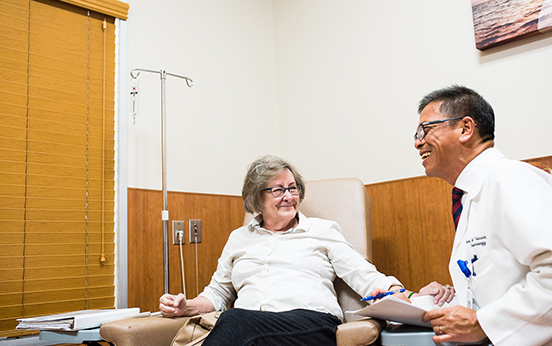- Find Center
- CH | EN
1.Blood test (blood drawing)
2.Urine test (Urine Test)
3.Ultrasonography of urinary system
The following problems can be reflected from results of the tests indexes: (Due to different types of tests, the standard indexes have differences to a certain extent. It is recommended to consult your kidney doctor with the results)
You will be asked by the doctor to provide a sample of urine, which can show whether there is protein in the urine. Protein leakage in the urine is an early symptom of kidney damage. It is possible to prevent the persistent lesion or delay the progress of the kidney disease if it is detected and treated at an early stage.
This is a screening test for diabetes, which can detect the blood glucose concentration over a period of time.
This indicator can indicate the red blood cell of your body. Hemoglobin carries oxygen to the whole body, and the latter then provides energy for body cells. If the number of red blood cells decreases, the body cells will not work with enough energy. This will lead to anemia, making you feel tired and not have enough energy. If not be treated in time, anemia will damage your heart health.

As a mineral exists in many foods, phosphorus is usually added as a preservative during food processing to prolong the storage time of foods. There is a large amount of phosphorus in lean meat, whole-grain breads, processed foods, carbonated drinks, cheeses, beans, livers, peanut butter, dairy products, chocolate and other foods. A healthy kidney can discharge excess phosphorus from the body. But if kidney failure occurs, phosphorus will accumulate in the blood, leading to bone and heart related diseases. Patients with chronic kidney disease may need to take a drug called phosphorus binder, which binds phosphorus from entering the blood when it is still in the stomach. So taking phosphorus binder according to prescription is very important to keep your bone and heart health. Your dietitian or doctor will let you know if it is needed to control your phosphorus intake, or take phosphorus binders.
Potassium is another electrolyte and a mineral that maintains the functions of nerve and muscle. Potassium, as an important factor affecting muscles and hearts to beat at normal rhythm, can cause danger if its level is too high or too low. Potassium exists in the foods you eat. A healthy kidney can remove excessive potassium through urine to maintain its normal level in blood. Some people with CKD may need to limit the intake of potassium in foods because their body cannot remove potassium. If you need to restrict the potassium content in your diet, your doctor or dietitian will tell you what you need to know.
If your kidney disease is diagnosed in an early stage, you may not notice that there have been slight dietary changes in the diet prescription given to you by the doctor. This is because there may be no symptoms in the early stage of kidney disease, and you may not even feel anything before the diagnosis. If you have symptoms such as edema, you will find that dietary changes can help you improve symptoms.
BUN, also known as "urea nitrogen", is a kind of waste produced by the metabolism of edible protein, which is normally discharged through the kidney. High levels of Urea means that your kidney cannot remove enough waste, thus remaining in the body, which is a sign of the declined kidney function.
Creatinine is another kind of waste produced by the regular muscle movement. Creatinine is also used to estimate your glomerular filtration rate (GFR). A healthy kidney can remove BUN and creatinine. When your test results show an increase in these values, it indicates that your kidney function is declining.
Albumin is a common protein in blood, which shows whether your nutritional status is good or not. Albumin is needed for the body to maintain its growth, fight infection, repair tissues and help clear liquid .
Testing of calcium, phosphorus and PTH levels can help to show whether your bones are healthy or not.

This is a kind of fat that exists in your body. Cholesterol is a waxy fat-like substance that exists in all cells of the body. Your body needs some cholesterol to make hormones, vitamin D and substances that help you digest food. The triglyceride level often rise in people’s body with kidney disease. You may need to reduce your triglyceride and cholesterol levels to avoid plaque formation in your blood vessels and reduce your risk of heart disease. Your doctor may ask you to take some drugs to reduce triglyceride and cholesterol.
1.What is chronic kidney disease (CKD)?
2.What kind of blood test results will indicate kidney disease?
3.What is GFR?
4.What is the cause of my kidney disease?
5.What stage is my kidney disease in?
6.What is dialysis?
7.Do I need to start dialysis, or will I need dialysis in the future?
8.Do I need to adjust my diet?
9.Can dietitians help me choose food?
10.What foods should I avoid?
11.What foods can I eat?
12.Do I need to change my current drugs?
13.Do I have hypertension?
14.How can I control my hypertension to maintain the health of my kidney?
15.Do I have diabetes mellitus?
16.Do I have diabetes mellitus type 1or diabetes mellitus type 2?
17.How should I control my diabetes mellitus so as to maintain the health of my kidney?
18.How often should I take a blood test?
If you need diagnosis or treatment, or information about your specific situation, then you could have an online consultation with our doctor. Emergency calls are available for your reference.
This website is for reference only and does not replace the physician's medical advice.
Copyright 2012-2020 © Jinan Huishang Network Technology Co., Ltd. all rights reserved
Case Number: 鲁ICP备2020048429号-1